- Home
- James Swain
The Night Monster
The Night Monster Read online
ALSO BY JAMES SWAIN
The Night Stalker
Midnight Rambler
Grift Sense
Funny Money
Sucker Bet
Loaded Dice
Mr. Lucky
Deadman’s Poker
Deadman’s Bluff
To Michael Connelly
Whoever fights monsters should see
to it that in the process he does not become
a monster. And when you look into an abyss,
the abyss also looks into you.
—NIETZSCHE
PROLOGUE
ops aren’t supposed to get frightened. The badge and the uniform and the gun strapped to a cop’s side are intended to ward off the normal fears that most people experience when confronted by unspeakable horror and evil.
But it doesn’t always work out that way. Cops get scared, just like everyone else. Sometimes they get so scared, they run for their lives. Other times, they get shaken to the core and never forget the things they’ve seen. It happened to me, two years into the job.
I was going home in my cruiser when I got the distress call. A woman was being assaulted at the Sunny Isle apartment complex, and a neighbor had called 911. Sunny Isle was a mile from where I lived, so I took the call.
According to the dispatcher, a college student named Naomi Dunn was being assaulted by a man inside her apartment. It had sounded like a domestic disturbance, something I’d dealt with many times as a cop. When the dispatcher had asked if I wanted backup, I’d said no, I could handle the situation. The dispatcher had told me to proceed with caution.
I arrived at Sunny Isle a few minutes later. Four orange stucco buildings made up the complex, with entrances from each apartment facing a courtyard containing a pool and a children’s play area. It had started to rain, and there were white caps on the water.
I searched for a place to park. The lot was filled with junkers, many with student tags. Several had bumper stickers that said Clinton in ‘92! I’d read about the Arkansas governor’s run for president, and didn’t think he had a chance.
I parked and got out of my cruiser. There was a yellow rain slicker in the trunk, but I didn’t bother to retrieve it. I was a native, and was used to getting drenched by the occasional downpour.
Walking into the courtyard, I scanned the unmarked stucco buildings. They were quiet, and I saw nothing out of the ordinary. I walked around for a few minutes, then decided to leave. It had been a long day, and I wanted to eat dinner with my wife and two-year-old daughter, then hit the books. I was studying to become a detective, and the lengthy test was weighing heavily on my mind.
“Officer! Officer!”
A ghostlike woman materialized by the pool. Dressed in a simple black housedress, her soaking wet hair was plastered to her head.
“Did you call the police?” I asked.
“That was me.”
Her voice was trembling, and she was shaking from head to toe. I couldn’t tell if there was something wrong with her, or if she was just plain scared.
“What’s the problem?” I asked.
“Earlier I saw a large man lurking around the complex. Then I heard noises from Naomi Dunn’s apartment. She was screaming, so I called nine-one-one.”
“Is Naomi Dunn still in her apartment?”
“Yes.” The woman pointed at the last building, on the ground floor. “He’s still in there, hurting her.”
“Do you know who he is?”
“No, but he was huge.”
I started to walk toward the building, and the ghostly woman called after me.
“Take your gun out,” she said.
The words made me freeze. I’d been trained not to draw my weapon unless my life was being threatened. The tone of her warning said that it was. Unstrapping my holster, I rested my hand on my gun’s handle.
“Please go inside your apartment and lock your door,” I said.
“Yes, Officer.”
I waited until the woman was in her apartment before I approached Dunn’s apartment, and put my ear to the door. There was banging and shoving inside, the sounds loud enough to be heard over the rain. I knocked and stepped back.
When no one answered, I went to the window, and peeked through the flimsy curtains. The apartment’s interior was a disaster area, with furniture uplifted and an upside down TV set on the floor with Dan Rather’s smiling face. A bloodstain on the wall made me shudder, a bloody hand dragged across the wall. It didn’t look like any domestic disturbance I’d ever seen.
Movement in the rear of the apartment caught my eye. Down the hallway and through an open door, a twenty-something woman stood inside a bedroom. Blond and powerfully built, she was throwing vicious kicks and punches at a person I could not see. The rapidity of the blows told me that she was schooled in self-defense, and made me wonder if the blood I’d seen had come from the person she was hitting.
I instinctively relaxed. I assumed this was Naomi Dunn, and could see that she was holding her own with her assailant. I had arrived just in time.
I drew my weapon and approached the door. I’d joined the police force because I thought I could make a difference. Twenty-four months into the job, and that still hadn’t happened. But tonight was going to be different. I was going to save a young woman before something awful happened to her. I had never been more ready in my life.
I tested the door’s handle. It was locked, and I lifted my leg and kicked three inches above the knob. The door splintered but did not come down. As I lifted my leg to kick it again, the door opened into my face. I heard my nose break, and flew backward to the ground.
I lay on my back with raindrops splashing on my face. My gun had left my hand and was lying somewhere nearby. Fighting the urge to pass out, I lifted my head, and saw a giant emerge from the apartment carrying an unconscious Dunn over his shoulder. From my vantage point it was hard to tell exactly how big he was. What registered was how small Dunn looked in comparison. She was a big woman, yet looked tiny slung over his shoulder.
“Police,” I muttered. “You’re under arrest.”
The giant gazed down at me, his face round and bloodied. He had wild eyes and pursed lips, and reminded me of the crazies that I often encountered on the mean streets of Fort Lauderdale. When he spoke, the words only confirmed my suspicion.
“Pigs don’t come to the party,” he said.
“Let her go.”
“No. She’s mine.”
Laughing, he walked around the corner of the apartment building and disappeared. I pulled myself up to a sitting position and looked for my gun. In the distance I heard tires squealing on wet asphalt.
I wiped away the blood coming out of my nose. I was hurting, yet none of that really mattered. I’d failed to stop him. I hadn’t made a difference at all.
“Officer! Officer!” The ghostly woman had appeared again, and was kneeling beside me. “He got away. I saw him throw Naomi into the back of a green van.”
“Did you get a license number?” I asked.
She brought her hand to her mouth. “No.”
I pulled myself to my feet and leaned against the open doorway. The world was spinning, and I felt ready to pass out. “Go to your apartment, and call nine-one-one. Tell them to hurry.”
The woman hurried away. Soon sirens pierced the air. They snapped me back to reality, and to the sad fact of how miserably I’d failed to do my job. Because I’d let my guard down, a young woman was lying unconscious in the back of a van.
I went to the parking lot to meet the responding officers. What had just happened would haunt me, and I promised myself that I would track this crazy bastard down.
I hadn’t known how long that would take.
CHAPTER 1
; he ceiling of my rented room was spinning.
My pillow was soaked with sweat, as were the sheets, and my heart was racing a hundred miles an hour. Next to me, my dog Buster was licking my face.
Sitting up, I leaned against the cool plaster wall behind my bed. Sunlight streamed through the slats in the windows, and I listened to the cawing of seagulls scrapping for food on the beach.
I looked at the night table beside my bed. Lying on it was a stack of missing person reports. After becoming a detective, I’d run the Broward County Sheriff’s Department’s brand-new Missing Persons Unit. I’d run the unit for sixteen years before being kicked off the force two years ago. The reports were copies of files that had gone unsolved during my tenure. Every few months I reread them, just to see if there was something I’d missed.
Before going to bed, I’d reread Naomi Dunn’s report. It had been the first case I’d worked when I’d joined Missing Persons, and was the reason that I’d chosen to work that unit, and not Homicide or Vice, which had also been available at the time. I considered myself responsible for what had happened to Dunn, yet now, eighteen years later, I knew no more about her disappearance than I did back then.
The file contained a profile of Dunn’s abductor written by the CSI team who’d examined the crime scene. Based on the abductor’s shoe prints, and the neighbor’s and my own eyewitness accounts, he was six feet ten inches tall, and weighed three hundred pounds. He was also crazy. This was based upon my own observations, and the fact that Dunn, a second-degree black belt, had knocked out two of his front teeth, which had been found in her apartment. A person in his right mind would have run away from Dunn, yet her attacker had not.
Dunn’s abductor should have been easy to find, only the opposite had been true. No crazed giants existed on the books of any Florida police departments, nor any hospitals or mental wards. Over time, I’d extended my search, and contacted police departments and mental hospitals around the country.
I’d found only one match.
His name was Ed Kemper. Kemper was a giant and a sociopath. He’d shot his grandparents at fourteen, then murdered his mother, her best friend, and six other women. By the time I found him, Kemper was serving seven consecutive life sentences in a Vacaville, California, prison and could not have abducted Dunn.
Eighteen years of looking, all dead ends.
I opened Dunn’s file on my lap. Its pages were dog-eared from use. Nearly every page had my handwritten notes scribbled in the margins. Although we’d never met, I had developed a bond with Dunn, and felt like I knew her.
I studied the crime scene photos taken at the apartment. Blood from the abductor’s wounds had been found in every room. I’d sent the DNA to the FBI, who’d stored it in CODIS, a computer system that contained the DNA of a quarter million known violent criminals. Hopefully a match would someday be made, and Dunn’s abductor would be brought to justice.
Jimmy Buffett’s “Cheeseburger in Paradise” floated across my room. It was the ring tone to my cell phone, a birthday present from my daughter, Jessie. I grabbed the phone off the night table. Caller ID said CANDY.
Detective Candice Burrell now ran Missing Persons, and was a friend. I made my living these days finding missing kids for police departments, and I was hoping she was calling with a job.
“Hello Detective Burrell,” I said.
“Am I glad you answered,” Burrell said. “I’m in a real jam. Are you busy?”
“My calendar’s wide open.”
“I’m at the courthouse waiting to give testimony in a trial, and I just got a call that an eight-year-old autistic boy has gone missing from Lakeside Elementary School. I need you to go find him.”
I slipped out of bed. A rumpled pair of cargo pants and a Tommy Bahama shirt lay on the floor. Within seconds they were hanging from my body.
“The boy’s name is Bobby Monroe, and he disappeared from his classroom about a half hour ago,” Burrell went on. “Four uniforms are at Lakeside now, and don’t have a clue as to where this kid went. They think he might have been abducted.”
As a cop, I’d dealt with many missing autistic kids. They were seldom targets for abductors, and I had a feeling something else was going on.
“Is the school locked down?” I asked.
“Yes. That was the first thing the principal did.”
“Good. Is Bobby Monroe in a special class for autistic children, or is he mainstreamed?”
“I don’t know what that is.”
“Many schools in Broward have autistic kids sit in regular classes with nonautistic kids. It helps develop them socially.”
“I think he’s in a regular class.”
“What’s his teacher saying?”
“The regular teacher is sick. There’s a substitute teacher today, and she’s freaking out.”
Autistic children often became distressed by simple changes in their daily routine, such as a change in classrooms or teachers, or even moving something on their desk, like a pencil or an eraser. The picture was getting clearer.
“Here’s what I’m thinking,” I said. “The appearance of the substitute upset Bobby, so he took off. Most autistic kids go to confined spaces to vent their anger. Bobby could be hiding in a closet, or maybe squeezed himself into a refrigerator.”
“Oh, Jesus—”
“Tell the uniforms at the school to start looking in every hidden space they can find. Also tell them not to call out Bobby’s name. He’ll hear them, and only make himself harder to find.”
“How soon can you be there?”
I grabbed my gun off the night table, and slipped it into the concealed holster in my pants pocket.
“Give me fifteen minutes,” I said.
“You’re a lifesaver,” Burrell said.
CHAPTER 2
nterstate 595 was the asphalt spine of Broward County, and ran from the ocean’s sandy beaches to the Everglades’ swampy marshes. Soon I was hurtling down it with the wind blowing in my face and Buster hanging out the passenger window.
I was waved through by a guard at the front gate of Lakeside Elementary. The school consisted of three mustard-colored buildings connected by covered walkways. It sat on a barren tract of land, surrounded by a six-foot-high chain-link fence that encompassed the entire property. Leashing Buster, I hurried inside.
A uniformed cop stood outside the principal’s office. His nameplate said D. Gordon. His tanned face bore more lines than a roadmap.
“You must be Jack Carpenter,” Officer Gordon said. “It’s good to meet you.”
I might have left the force under a dark cloud after beating up a suspect, but I still had my fans in the department. I asked Gordon for an update.
“Two groups of teachers and all of the maintenance men have turned the school upside down,” Gordon said. “We haven’t found a trace of Bobby Monroe. I’m beginning to think he’s not here.”
“Do you think he left the grounds?”
“That’s what my gut’s telling me.”
“There was a guard at the front entrance when I drove in. How would Bobby have gotten past him?”
“I don’t know. I just don’t think Bobby’s here. We’ve looked everywhere.”
Gordon looked about fifty. Age counted for something when you were a cop. If Gordon’s gut was telling him that Bobby Monroe wasn’t here, he was probably right.
“I want to speak with the kids in his class,” I said.
“Follow me. What’s with the pooch?”
“He helps me find things.”
“Good. We could use some help.”
Gordon led me down a hallway to a classroom doorway. We passed a number of rooms filled with kids that were in lockdown mode. Until Bobby Monroe’s whereabouts were determined, none of the children in Lakewood were going anywhere. Gordon put his hand on the doorknob and glanced at me.
“Be careful what you say to the substitute teacher. She’s a nervous wreck, and I don’t want to send her over the edge.”
“W
hat’s her name?”
“Ms. Rosewater.”
We entered the classroom. Ms. Rosewater stood at the blackboard, a plump, pale, bespectacled young woman with her hair tied in a bun. About thirty kids sat at their desks, facing her. Seeing my dog, they stood up in their chairs and started chattering loudly.
“Class, be quiet,” she said.
Her voice sounded ready to crack. I introduced myself.
“I’d like to speak to the children,” I said.
“By all means,” she replied.
I faced the kids and made Buster lie on the floor. My dog was a brown, pure-bred Australian Shepherd with a docked tail—not a common breed. The kids stared at him like he was some exotic animal in the zoo.
“Good morning. My name is Jack Carpenter, and this is my dog Buster. We’re going to help the police find your missing classmate. Before we do that, I need to ask you some questions. Who was the last person to see Bobby Monroe?”
A little girl in pigtails sitting in the front row raised her hand.
“What’s your name?”
“Missy.”
“Tell me what happened, Missy.”
“We were going to gym. Miss Rosewater had us line up by the door. Bobby was right behind me. We went into the hall, and I asked Bobby if he was feeling okay. He didn’t say nothing. I turned around, and he was gone.”
“Did he run back into the classroom? Or down the hall?”
“I don’t know where he went.”
“Why did you ask Bobby if he was okay?”
“He was banging his desk and making really weird noises. I thought maybe he had a bellyache.”
I glanced at Ms. Rosewater. “Which desk is Bobby’s?”
The substitute teacher led me to an empty desk in the room’s center. Over the back of the chair hung a blue knapsack, which I opened and quickly searched. A crumbled candy wrapper caught my eye. It was for a bag of peanut M&Ms, and had Harrison Ford’s photo splashed across the wrapper promoting the new Indiana Jones movie. Walking to the front of the room, I held the wrapper in the air.
“Does everyone know what this is?” I asked.

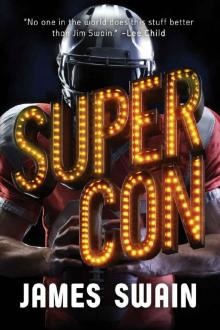 Super Con
Super Con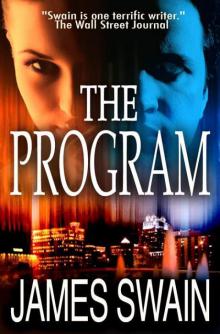 The Program
The Program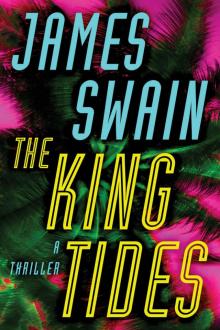 The King Tides (Lancaster & Daniels Book 1)
The King Tides (Lancaster & Daniels Book 1)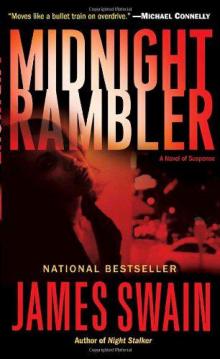 Midnight Rambler
Midnight Rambler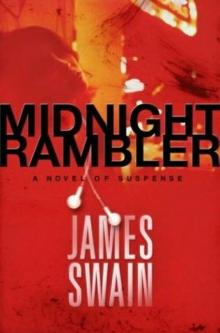 Midnight Rambler jc-1
Midnight Rambler jc-1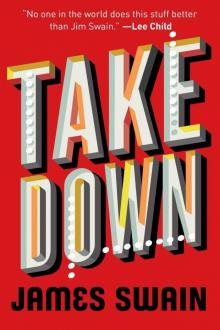 Take Down
Take Down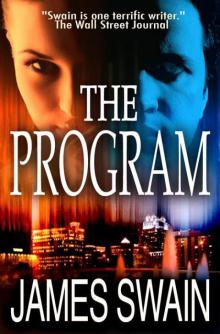 The Program (Jack Carpenter series)
The Program (Jack Carpenter series) Dark Magic
Dark Magic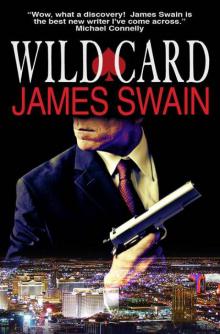 Wild Card (Tony Valentine Series)
Wild Card (Tony Valentine Series)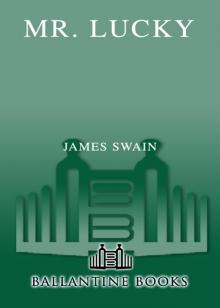 Mr. Lucky
Mr. Lucky Deadman's Poker: A Novel (Tony Valentine)
Deadman's Poker: A Novel (Tony Valentine)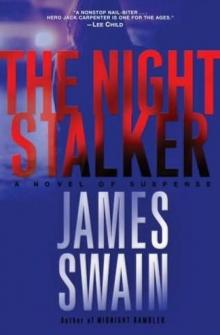 The Night Stalker jc-2
The Night Stalker jc-2 Loaded Dice tv-4
Loaded Dice tv-4 Loaded Dice
Loaded Dice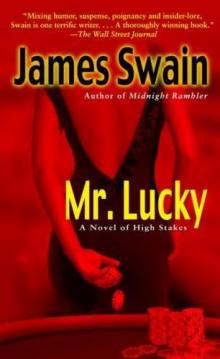 Mr. Lucky tv-5
Mr. Lucky tv-5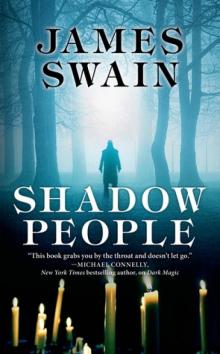 Shadow People
Shadow People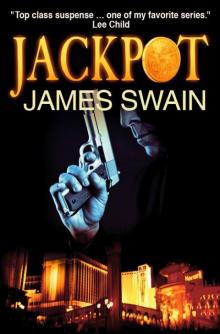 Jackpot tv-8
Jackpot tv-8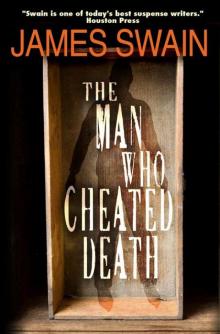 The Man Who Cheated Death (Vincent Hardare)
The Man Who Cheated Death (Vincent Hardare)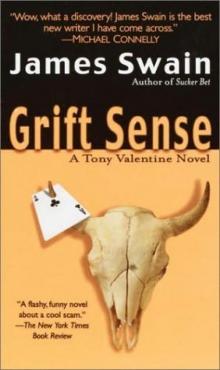 Gift sense tv-1
Gift sense tv-1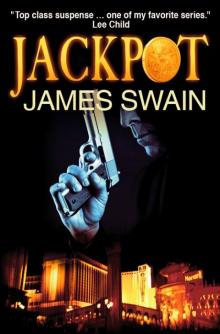 Jackpot (Tony Valentine series)
Jackpot (Tony Valentine series)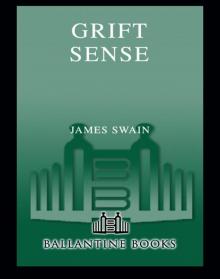 Grift Sense
Grift Sense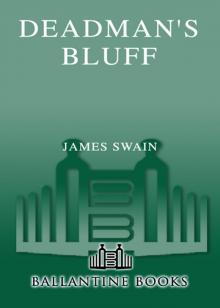 Deadman's Bluff
Deadman's Bluff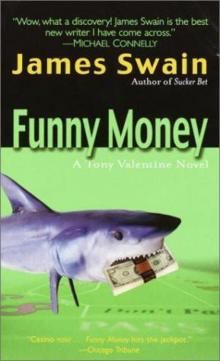 Funny Money tv-2
Funny Money tv-2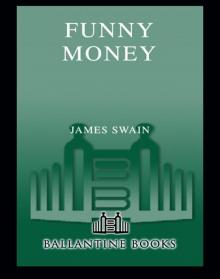 Funny Money
Funny Money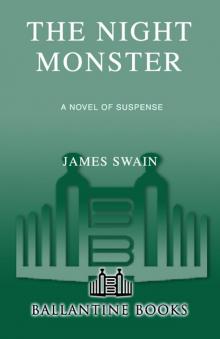 The Night Monster
The Night Monster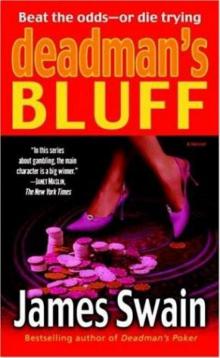 Deadman's Bluff tv-7
Deadman's Bluff tv-7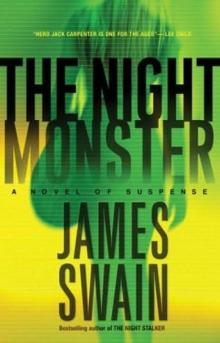 The Night Monster jc-3
The Night Monster jc-3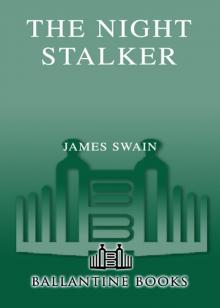 The Night Stalker
The Night Stalker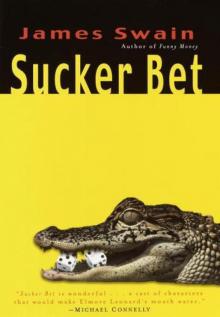 Sucker Bet tv-3
Sucker Bet tv-3